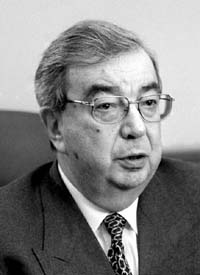Ending the Chechen Nightmare

Once again, Russia’s war in Chechnya — which has rumbled murderously on for a decade — has blasted its way onto Moscow’s streets. The horrific death toll among innocent theatergoing Muscovites confirms Russia’s struggle against Chechen rebels as a distinct and bloody front in the global war on terrorism. That war must be won. But the time has also come for Russia to change its policy. Chechnya should remain part of the Russian Federation. But, clearly, that strategic goal cannot be achieved by military means alone.
Time after time, Russian federal forces deliver devastating blows on the Chechen insurgents. But the Chechen resistance is never crushed as was proved, not only by the taking hostage of over 800 Muscovites, but by the numerous successful Chechen raids on Russian troops in and around Chechnya. It would be wrong to put the entire blame for Russia’s inability to crush the rebellion on our military commanders, although their planning could be better. Why not? Because the Chechen rebellion began in politics and it can only end through a political understanding.
What should be done? The first step must be to separate peaceful Chechens from the rebels. Regrettably, Russia failed to do this at the insurrection’s onset, primarily because the bandits resided in villages and towns, which meant that many civilian deaths ensued when Russian forces attacked the rebels head on.
Today, Russian federal forces are trying to separate the common people from the bandits by entrusting the powers of self-government and security in Chechen settlements to indigenous Chechens. But this method is not working and won’t work if pursued along the current lines. Most peaceful Chechens have not fully turned their backs on the bandits, perhaps because the bandits hunt down those who collaborate with Russian authorities. Moreover, many Chechens fear Russian officials more than the bandits.
This transfer of executive authority to local Chechen self- governments will continue to fail unless local Chechen rebel commanders are induced to join the talks. These commanders are often clan leaders who have never stood for election, and won’t ever consider putting their authority up for a vote. These men alone have the ability to deliver peace, if not democracy. If maintaining their authority and local autonomy is the price that must be paid to end, or at least limit the slaughter, Russia should agree.
The big worry here, however, is that some Chechen rebels want to negotiate so as to play for time to regroup and re-supply themselves. The global war on terrorism has made it more difficult for them to secure financial and material support. Afghanistan is no longer a training and supply base; Saudi Arabia and Turkey now strictly control citizens who once helped Chechen separatists. Even Georgia now closely — although not as closely as Russia would like — restricts Chechen activity. The world must assist Russia in seeing to it that alternative supply routes for the rebels do not materialize.
A year ago, President Putin offered negotiations between his representative and an envoy of Aslan Maskhadov, the Chechen rebel warlord who won internationally supervised elections as Chechen president in 1997. That initiative collapsed because the Chechens were ordered to surrender their weapons within 72 hours. But President Putin intended them to have 72 hours to ponder the good that might come from negotiations if they surrendered their weapons, not an instant surrender.
That clumsy diplomacy should not stop talks from getting underway. But to start them, a cease-fire is needed as the first step, to be swiftly followed by the Chechens publicly dissociating themselves from terrorist acts such as the Moscow slaughter. Anything less would be utterly unacceptable to ordinary Russians traumatized by the body count of dead hostages in Moscow.
It must also be understood that negotiations cannot rule out Russian military operations against bandits who continue their attacks as the negotiations ensue. Thus part of the federal forces must remain in Chechnya during any peace talks, which will also serve to strengthen the hand of those Chechens who choose to negotiate and are prepared to ensure the security of their settlements.
But just because Russia’s troops will remain in Chechnya during any peace talks does not mean that they should conduct the talks. This happened after the first Chechen campaign (1994-1996), but the peace that ensued was merely an armed truce.
Instead, a representative of President Putin must oversee everything in Chechnya: economic development, military action, and efforts to alleviate the suffering of the Chechen population. This person should assume control of Defense Ministry units, Interior Ministry troops, FEB agencies, and local administrations.
Chechnya could be granted the status of a special presidential area throughout any negotiations — indeed, until local Chechen authorities establish their ability to enforce the rule of law. A single command accountable directly to President Putin would rule out uncoordinated actions, improve discipline, strengthen the responsibility of those who are dealing with Chechnya, and diminish the carelessness with Chechen civilian lives of some Russian commanders.
The world now sees and understands the mighty burden Russia has borne, and is bearing, in Chechnya. It must also know that international solidarity in the war on terror must mean not only Russia supporting America in Afghanistan, but America and the West backing Russia in its counter-terrorist struggle. The terrible death count in Moscow, much as Russians may want to seek revenge, must also help all Russians see that Chechnya is a political problem demanding a political, not a military, solution.






